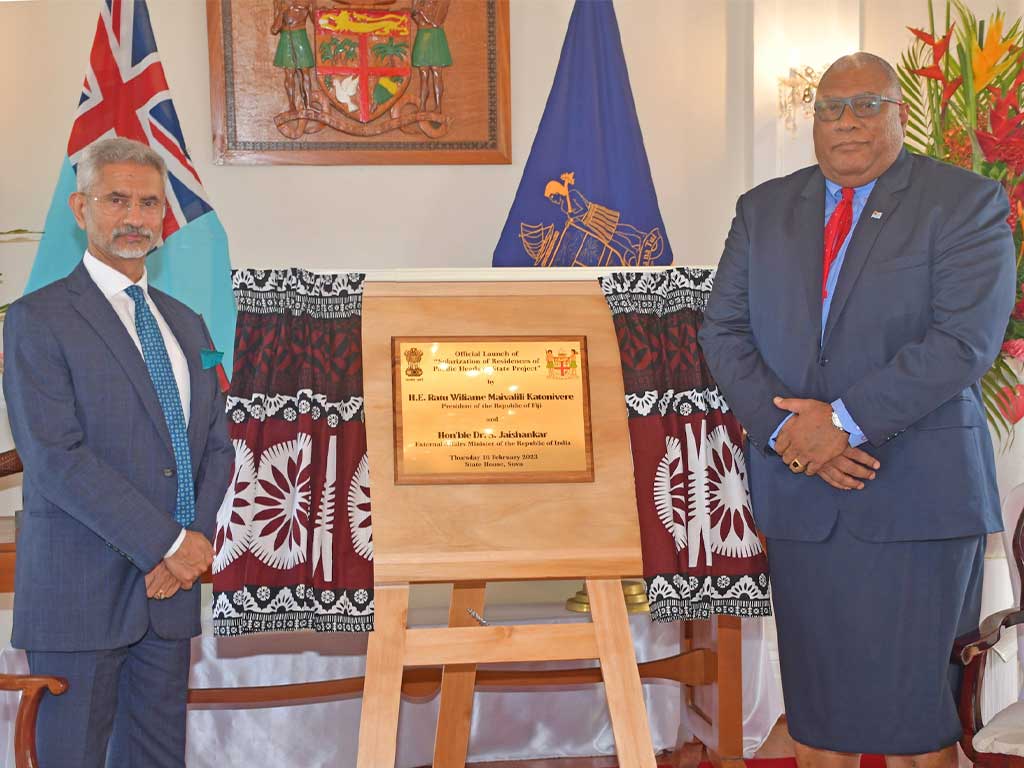The Pacific region’s ambitious renewable energy targets continue to move forward with the recent unveiling of a joint initiative led by the Pacific Islands Development Forum (PIDF) in the Fijian capital of Suva in February 2023. Aimed at highlighting the immediate energy security and sustainable development advantages that solar energy can provide, the Solar Head of State project was launched via the installation of solar panels on the Fijian presidential residence in a bid to demonstrate these benefits first-hand to Fiji’s leadership. This $1.3 million USD programme is funded by the India Development Partnership Fund Programme (IDPFP) with support from the United Nations Development Programme (UNDP), United Nations Office of South-South Cooperation (UNOSCC) and Solar Head of State (SHOS).
His Excellency, the President of Fiji Ratu Wiliame Maivalili Katonivere and the Minister of External Affairs of the Government of India, Mr. Subrahmanyam Jaishanka were present at the launch alongside representatives of all partner organizations. Speaking to the importance of partnership and collaboration towards sustainability goals, Mr Jaishanka emphasized the strong ties between India and Fiji, and how the solarization programme in the Pacific was part of New Delhi’s continued commitment to the region. The project was covered by major Indian outlets including The Hindu and Hindustan times.
Following this launch of this inaugural pilot project in Fiji, the PIDF and SHOS are carrying out similar initiatives across the region in the Federated State of Micronesia, Kiribati, Palau, Nauru, Marshall Islands, Solomon Islands Tonga, Tuvalu, Timor-Leste, and Vanuatu. SHOS will also train local staff, laborers, and volunteers, who will assist with the construction, operation, and maintenance of the panel. Every aspect of the project has been created to empower local communities by providing them with the skills and knowledge needed to accelerate the transition to renewable energy in their communities. Fiji, like many of its neighboring countries, faces multiple energy challenges, including:
- Limited range of indigenous energy resources;
- High cost of developing energy resources and extending service to remote populations;
- Poor quality of energy data and trends;
- A small base of skilled people to address the issues; and
- Weak bargaining positions with petroleum suppliers.
“The costs for renewable power generation have continued to decline, with most renewable electricity-generating options, particularly wind and solar, less expensive than fossil fuel options,” notes Secretariat of the Pacific Regional Environment Programme (SPREP) in a data report, “That said, up-front investment can still be a barrier. Energy is typically a separate budget from environmental management although the transition to renewable energy is mutually beneficial.” Alongside Papua New Guinea, Samoa, Cook Islands, Tuvalu and Vanuatu, Fiji has a 100% renewable energy production target. Niue (80%), Tonga and Naura (50%) are also seeking high implementation goals, while remaining Pacific island nations are targeting 20-45% renewable energy production.
A recent energy update by the Asian Development Bank (ADB) reveals an increase in renewable energy implementation across the Pacific in line with these goals. Both organizations highlight the contrasting issues facing the renewable energy transition in the Pacific, with the main barrier to entry the high up-front costs of installations. However, this may be changing as the region becomes attractive for foreign investments into renewables, as the International Finance Corporation (IFC) expresses in a 2021 report, “Most Pacific nations have ambitious renewable energy targets which call for huge investment, a significant part of which is expected to come from the private sector. The IFC, with the governments of Australia and New Zealand, share a call for action to the global renewable energy community that the Pacific offers an unparalleled opportunity for remote, energy challenged economies to rapidly adopt renewables.”
The PIDF-led solarization project, also covered in the Fiji Times, currently underway in the region is an example of a whole-of-society approach that combines partners from the public and private sectors, as well as civil society to build resilient communities. Similar partnerships across other island-groups have helped create an innovative governance environment capable of identifying, developing, and funding local initiatives. This project is laying the groundwork for further development of the solar and renewable energy sectors in the Pacific and will contribute to the continued decarbonization and resilience-building of the region.
The private sector company Solaria Corporation has contributed solar photovoltaic panels equivalent to an estimated total of US$120,000 across 12 projects. PIDF and SHOS in-kind contributions are also equivalent to an additional estimated total of US$120,000 towards the public awareness campaigns on renewables for the region.





